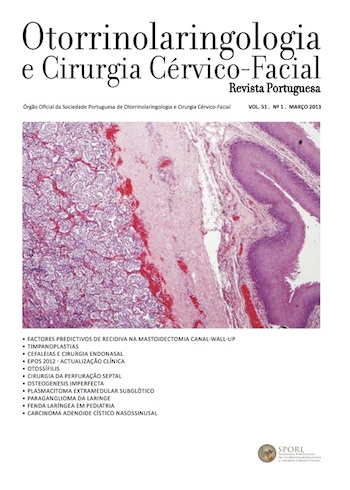Tradução e adaptação cultural para Portugal do questionário “Vanderbilt Pediatric Dizziness Handicap Inventory for Patient Caregivers” para avaliação de vertigem pediátrica
DOI:
https://doi.org/10.34631/sporl.1028Palavras-chave:
Crianças, Tontura, Inquéritos e Questionários, Grupos Focais, Cuidadores, PortugalResumo
As perturbações vestibulares na infância podem levar a comportamentos de evitação, com efeitos adversos associados, sendo o diagnóstico célere importante. Este trabalho tem como objetivo a tradução para português europeu e adaptação cultural para Portugal do questionário “Vanderbilt Pediatric Dizziness Handicap Inventory for Patient caregivers” (DHI-PC). A sequência metodológica utilizada foi baseada nas recomendações da literatura internacional. Foram realizados três grupos focais para avaliar a preservação do constructo e a correta compreensão de frases e expressões. A equipa responsável pela adaptação chegou a consenso tendo em conta as alterações discutidas nos grupos focais, com o objetivo de conseguir uma equivalência semântica, idiomática, experimental e conceptual, que garantisse uma tradução precisa e uma adaptação cultural adequada. Para a sua utilização na prática clínica, a validação do instrumento será realizada numa segunda fase.
Downloads
Referências
McCaslin DL, Jacobson GP, Lambert W, English LN, Kemph AJ. The development of the vanderbilt pediatric dizziness handicap inventory for patient caregivers (DHI-PC). Int J Pediatr Otorhinolaryngol. 2015 Oct;79(10):1662-6. doi: 10.1016/j.ijporl.2015.07.017.
Jahn K, Langhagen T, Schroeder AS, Heinen F. Vertigo and Dizziness in Childhood − Update on Diagnosis and Treatment. Neuropediatrics. 2011 Aug;42(4):129-34. doi: 10.1055/s-0031-1283158.
Murdin L, Morrison GAJ. Balance disorders in children. In: Watkinson JC, Clarke R. editors Scott-Brown’s Otorhinolaryngology Head & Neck Surgery 8th Ed. Boca Raton: CRC Press; 2018. p. 219–30.
Pavlou M, Whitney S, Alkathiry AA, Huett M, Luxon LM, Raglan E. et al. The Pediatric Vestibular Symptom Questionnaire: A Validation Study. J Pediatr. 2016 Jan;168:171-177.e1. doi: 10.1016/j.jpeds.2015.09.075.
Dieterich M, Obermann M, Celebisoy N. Vestibular migraine: the most frequent entity of episodic vertigo. J Neurol. 2016 Apr;263 Suppl 1:S82-9. doi: 10.1007/s00415-015-7905-2.
Devaraja K. Vertigo in children; a narrative review of the various causes and their management. Int J Pediatr Otorhinolaryngol. 2018 Aug;111:32-38. doi: 10.1016/j.ijporl.2018.05.028.
van de Berg R, Widdershoven J, Bisdorff A, Evers S, Wiener-Vacher S, Cushing SL. et al. Vestibular migraine and recurrent vertigo of childhood: diagnostic criteria consensus document of the classification Committee of Vestibular Disorders of the Bárány Society and the International Headache Society. J Vestib Res. 2021;31(1):1-9. doi: 10.3233/VES-200003.
Bigelow RT, Semenov YR, Hoffman HJ, Agrawal Y. Association between vertigo, cognitive and psychiatric conditions in US children: 2012 National Health Interview Survey. Int J Pediatr Otorhinolaryngol. 2020 Mar;130:109802. doi: 10.1016/j.ijporl.2019.109802.
Beaton DE, Bombardier C, Guillemin F, Ferraz MB. Guidelines for the Process of Cross-Cultural Adaptation of Self-Report Measures. Spine (Phila Pa 1976). 2000 Dec 15;25(24):3186-91. doi: 10.1097/00007632-200012150-00014.
Verdecchia DH, Hernandez D, Andreu MF, Salzberg S. Translation and cross-cultural adaptation of the Visual Vertigo Analogue Scale for use in Argentina. Acta Otorrinolaringol Esp (Engl Ed). Sep-Oct 2020;71(5):289-295. doi: 10.1016/j.otorri.2019.10.003.
Jacobson GP, Newman CW. The Development of the Dizziness Handicap Inventory. Arch Otolaryngol Head Neck Surg. 1990 Apr;116(4):424-7. doi: 10.1001/archotol.1990.01870040046011.
Garcia FV, Luzio CS, Benzinho TA, Veiga VG. Validation and adaptation of dizziness handicap inventory to the portuguese language and population. ACTA ORLTécnicas em Otorrinolaringol. 2008;26(2):128–32.
Kim TH, Cha HE, Lee JG, Im GJ, Song JJ, Kim SH, et al. The Study of Standardization for a Korean Dizziness Handicap Inventory for Patient Caregivers. Korean J Otorhinolaryngol-Head Neck Surg. 2019 Aug; 62(8):442–7. doi:10.3342/kjorl-hns.2019.00416.
Downloads
Publicado
Como Citar
Edição
Secção
Licença
Direitos de Autor (c) 2023 Os autores mantêm os direitos de autor deste artigo.

Este trabalho encontra-se publicado com a Licença Internacional Creative Commons Atribuição-CompartilhaIgual 4.0.






